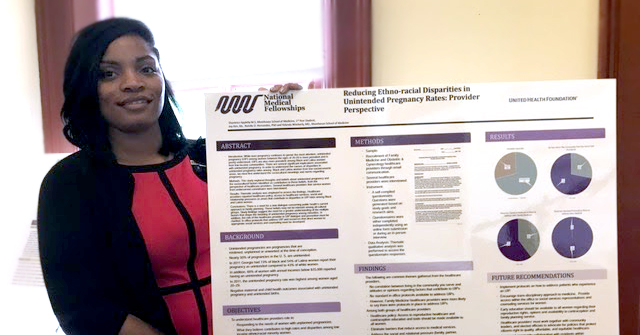 Shantrice Appleby is only a second-year medical student, but her medical education really began in elementary school. Appleby often accompanied her chronically ill grandmother to the doctor, and would feel frustrated when the treatments they gave her didn’t help. She took matters into her own hands and started reading up on her grandmother’s health conditions, to help her get better.
Shantrice Appleby is only a second-year medical student, but her medical education really began in elementary school. Appleby often accompanied her chronically ill grandmother to the doctor, and would feel frustrated when the treatments they gave her didn’t help. She took matters into her own hands and started reading up on her grandmother’s health conditions, to help her get better.
Harnessing resilience
Appleby’s experiences in the health system and desire to make a difference for patients like her grandmother led her to pursue a career in medicine. She received a BA in Psychology and MS in Preclinical Science, while volunteering at Helping Hands Outreach, a non-profit clinic in Georgia. Treating patients at Helping Hands reinforced Appleby’s belief in community-based approaches to health.
“I loved being able to speak with patients about their experience with health care,” says Appleby, “There is so much resilience in these communities despite so many of the ‘shortcomings’ others see.”
A force for right care
At Morehouse School of Medicine, Appleby has taken every opportunity to become a student leader and force for right care. She is co-director of the student-run clinic, vice-president of the school’s family medicine interest group, and treasurer of MSM’s Student National Medical Association chapter. And all this while raising her nine-year old son.
One unexpected challenge for Appleby has been the culture of medicine. “I didn’t know medicine was a business, that you need a business state of mind,” she says. But she is determined to graduate with the same passion and idealism she started with, and to keep thinking about patients first.
A primary care mindset
Learning about the Right Care Alliance and attending the Lown Institute conference has helped Appleby pursue her goal of improving community health. On her blog, she writes about her experience at the conference, hearing the latest right care research, meeting other clinicians and patient advocates, and attending participatory workshops. “I came out of the conference with ideas on how the Right Care Alliance could be applied to the communities I serve,” she writes.
Appleby is eager to collaborate on Right Care projects with others in Atlanta. “Whether you’re a nurse, a doctor, or a social worker helping people find resources, everyone has something to offer,” she says. She hopes to raise awareness about the RCA at her school and holding a “What Worries You” campaign.
As for her own medical career, Appleby is strongly leaning toward family medicine, but isn’t ruling out other specialties. “But whatever discipline I go to, I want to have a primary care mindset,” says Appleby, “I want to be able to direct my patients to resources or lifestyle changes.”

